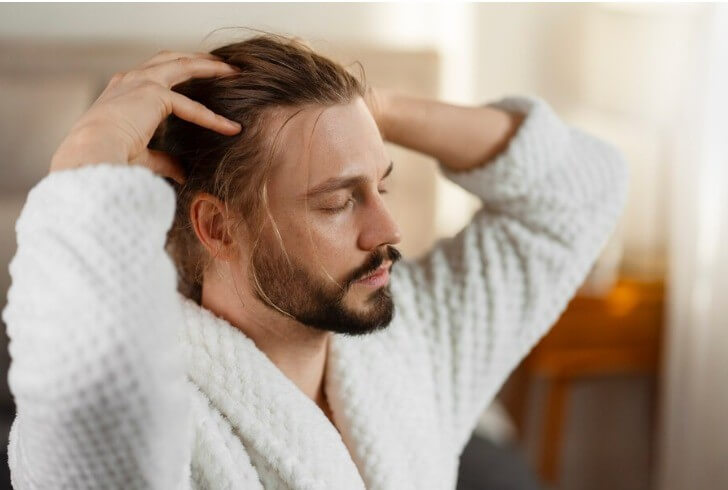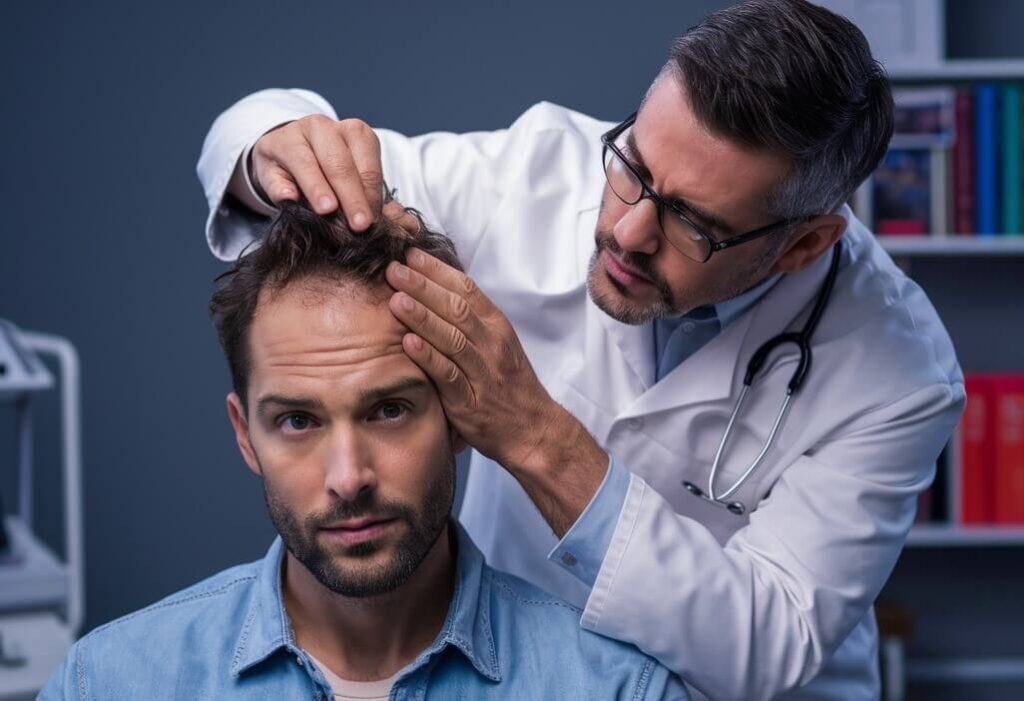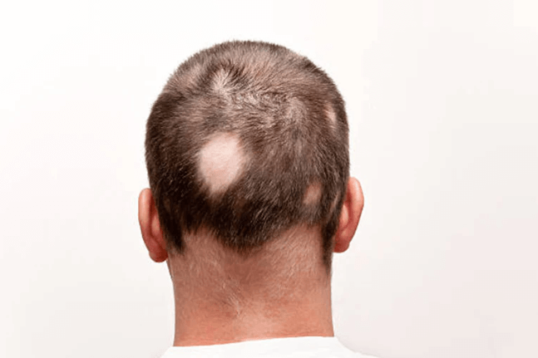Dry hair is a common issue for men.
Dry hair is often associated with bad days, but it may be much more than that. It might also give your hair a harsh, lifeless, and dull appearance. It may even cause split ends and break in hair, making it more brittle. You know it’s annoying?
Using these dry hair care tips for men, you can take good care of your hair. You may have thick, shiny hair again if you give it the proper care.
We’ll talk about the causes of dry hair in males and how to identify it next time. We’ll offer suggestions for dealing with it and preventing it. It will cover some efficient home remedies for dry hair and when to need medical help.
Do you wish to modify impeove your hair immediately? Alright, let’s get started with these Dry Hair Care Tips for Men.
Knowing the Reasons Behind Men’s Dry Hair
By being aware of these factors, Dry Hair Care Tips for Men can help prevent dry hair and keep hair healthy.
How to Identify Dry Hair in Men
Signs and Symptoms:
- Brittleness: Your hair feels coarse and rough when touched. It might crumble to the touch if you tried to run your fingers through it.
- Split Ends: Your tips are rough, and this is a sign of dry hair.
- Frizziness: Dry hair causes frizz, making one’s hair appear unhealthy and uncontrollable.
- Lack of Shine: The appearance of hair is shiny when it reflects light and is evidence of healthy hair. If your hair appears limp, flyaway, and flat, your hair could be dry.
Differentiating Dry Hair from Other Issues:
- Dry Hair vs. Dandruff: Dandruff produces scaly skin on the scalp, whereas dry hair only affects the hair shaft. If you see flakes on your head, you may have dandruff.
- Dry Hair vs. Scalp Conditions: Skin diseases such as psoriasis or eczema may result in scaly, itchy, and dry scalps. If your scalp is itchy with dandruff and your hair is dry, it is advisable to see a dermatologist.
Self-Assessment Tips:
- Touch Test: Touch your hair. If it feels rough and easily breaks, then know it’s dry.
- Look at the Ends: Check for split and frayed hair ends.
- Check for Shine: Hold yourself under a light source and see if your hair bounces light off you. Lack of hair shine may suggest that the hair is dry.
- Frizz Factor: Observe how your hair responds to weather changes. When hair becomes frizzy, especially in the presence of humidity, this could indicate that it is dry.
Understanding these signs and symptoms will help you evaluate the health state of your hair so that you can work towards improving it.
Practical Dry Hair Care Tips for Men

Gentle Shampoo for Men’s Dry Hair
- The Importance of Using Sulfate-Free and Moisturizing Shampoos: Sulfates are very aggressive and remove all the natural moisture from hair. Choose hair loss shampoo for men that do not contain sulfates and those with moisture-rich ingredients such as glycerin, aloe vera, and natural oils.
- Recommended Frequency of Shampooing: Washing hair daily can strip off the scalp’s natural sebum, making it dry. Try shampooing your hair 2-3 times weekly to keep it moist without chemical treatments.
Conditioning regularly to preserve hair moisture:
- Benefits of Regular Conditioning: Conditioning aids in replenishing the lost moisture; thus, your hair becomes softer and more friendly to manage. It also benefits the texturizing of the hair cuticle, leading to a reduction in frizz.
- Types of Conditioners Suitable for Dry Hair: A regular conditioner should be used after every wash; the leave-in conditioner and deep conditioning should be applied weekly.
Do Not Use Hot Water to Avoid Their Hair Drying Up in Men
- Explanation of How Hot Water Can Strip Hair of Its Natural Oils: It is also worth noting that too much on the hair cuticle by hot water may cause hair to become dry and brittle due to loss of its moisture and natural oils.
- Tips for Using Lukewarm or Cool Water Instead: Wash your hair with warm water and rinse it. When rinsing the hair for the final time, use cold water to close the hair cuticle and retain moisture.
How to Guard Your Hair against the Sun’s UV Radiation
- Effects of UV Radiation on Hair Health: Excessive exposure to the sun affects the hair cuticle, rendering the hair dry, discoloured and brittle.
- Tips for Sun Protection: Always wear hats or caps when out in the sun for a long time. Some hair products come with UV protectants, which can help protect hair from the sun’s rays.
Do Not Use Chemical Products to Dry Your Hair
- Risks Associated with Chemical Treatments: Chemical services such as colouring, perming, and straightening damage hair and weaken and dry it.
- Alternatives to Chemical Treatments: Use natural and least invasive approaches. For instance, opt for semi-permanent hair dyes instead of permanent ones, or use styling techniques that will allow you to get the look you want without using heat on your hair.
Hair Masks as a Part of the Hair Care Regime
- Benefits of Using Hair Masks for Deep Conditioning: Hair masks are a deep conditioning treatment that penetrates the hair shaft and nourishes damaged hair.
DIY Hair Mask Recipes and Recommended Products:
- Coconut Oil and Honey Mask: Combine coconut oil and honey in a 1:1 ratio. Massage on damp hair, allow it to penetrate for 30 minutes and wash it out.
- Avocado and Olive Oil Mask: Mash one grown avocado and add two tablespoons of olive oil. Massage into hair; leave it on for 20-30 minutes, then wash off.
- Recommended Products: I prefer masks containing shea butter, argan oil, and keratin, as these ingredients add moisture and repair to the hair.
By implementing these Dry Hair Care Tips for Men, you will be able to control and enhance dry hair, resulting in healthier, shinier, and easier-to-handle hair.
Avoid using hair dyes and chemical treatments, as they can dry out hair and cause damage.
Homemade Hair Treatments for Dry Hair in Men
| Treatment | Ingredients | Instructions |
|---|---|---|
| Avocado Mask | Ripe avocado, olive oil | 1. Mash avocado and mix with olive oil until smooth. 2. Utilize to damp hair and leave for 30 mins. 3. Rinse thoroughly with lukewarm water. |
| Egg and Honey Treatment | One egg, honey | 1. Beat egg and mix with honey until well combined. 2. Apply to damp hair and leave for 20 mins. 3. Rinse thoroughly with cool water. |
- Step-by-Step Instructions for Applying Home Remedies
- Prepare the Mixture: Mix ingredients thoroughly in a bowl until smooth.
- Apply to Hair: Start at the roots and work the mixture to the ends.
- Massage Gently: Massage the mixture into your scalp for a few minutes.
- Leave on: Protect your hair with a shower cap and leave the treatment on for 20-30 minutes.
- Rinse Out: Rinse thoroughly with lukewarm water and a mild shampoo.
You may naturally restore moisture and vibrancy to your dry hair with regular home treatments and our Dry Hair Care Tips for Men.
Best Practices for Dry Hair Care tips for Men
Such practices and Dry Hair Care tips for Men help ensure that hair is healthy and moisturized during the dry season and does not become damaged.
Using satin or silk pillowcases lowers friction, keeping moisture levels stable and minimizing damage of hair.
Preventing Dry Hair in Men
The likelihood of having dry hair will be decreased and long-term hair health will be improved with these preventative and dry hair care tips for men in place.
If you swim frequently, wear a swim cap to protect your hair from the drying effects of chlorine. Rinse your hair immediately after swimming.
When to Seek Professional Help for Dry Hair Issues

Indicators to See a Dermatologist or Trichologist:
- Persistent Dryness: If your hair still feels coarse, stringy or dried after adopting the correct home regimen and products.
- Scalp Irritation: If there are other symptoms like itching, redness or flaking when the scalp is dry, then the dry scalp has other complications.
- Hair Loss: Even if one starts noticing that he is losing hair in significant amounts or is becoming dry, it might be sinister.
- Scalp Treatments: A dermatologist can flush out medicated shampoos or topical treatments for conditions affecting the scalp that result in dry hair.
- Nutritional Counseling: Dieticians, nutritionists, and trichologists can discuss which foods to incorporate into the diet and which vitamins to supplement the hair.
- Professional Hair Treatments: Consult your hairdresser for deep conditioner treatments, scalp massages, and laser treatments that can effectively moisturize dry hair.
To treat any persistent hair problems, one should seek professional help Dry Hair Care tips for Men to diagnose them correctly and receive the relevant treatment.
Conclusion: Maintaining Healthy Hair with Proper Dry Hair Care Tips for men
Some strategies that can help manage dry hair care tips for men are the following:
Gentle Hair Care: They should use sulfate-free shampoos, condition their hair frequently, and avoid using hot water to rinse the hair, which will help retain natural oils.
Home Remedies: For intensive conditioning, start practising ayurvedic treatments such as avocado face masks and hair masks made from eggs and honey.
Best Practices: Use daily activities and moisturization to prevent skin dryness.
Following these dry hair care tips for men will help you add more moisture back into your hair, making it less prone to damage and easier to handle. So, my advice is that, like most things in life, you must be patient and consistent if you want to see progress in your hair.
My goal is to keep your hair looking as good as it feels!
FAQs
What are the reasons men have dry hair?
Some causes of dry hair in men are environmental factors such as the sun, dry air, washing hair with the wrong shampoos, using products containing alcohol in their formulation, and genetics.
What are some symptoms of hair becoming too dry?
Some of the symptoms include dryness, split ends, extreme frizzy hair, dullness, and difficulty managing hair. If the hair feels like sandpaper or splits when touched, this is a sign that it could be dry.
How frequently should one wash their hair if they have dry hair?
Those with dry hair should wash it 2-3 times a week to avoid removing the essential sebum in keeping hair moist. Choose sulfate-free and moisturising shampoos to ensure that the hair remains damp.
Does stress impact dry hair?
Yes, stress reduces the secretion of sebum on the scalp, causing dehydration of the hair shaft and dry hair.
What types of vitamins or supplements should one take to improve the quality of dry hair?
Some vitamins include Biotin (B7), Vitamin D, and Omega-3 fatty acids, which help stimulate hair health and hydration. Please always seek the advice of a health professional before taking any supplements.
Does wearing hats or caps have an impact on hair?
It’s also essential to wear hats or caps, as they shield hair from factors such as ultraviolet radiation and wind, which can cause dryness. It is advisable to select hats made from materials that do not retain moisture.
Can pollution have an impact on dry hair?
Yes, pollution and toxins in the environment can lead to dry hair, as they remove hair oils and harm hair. Wash hair well when you come into contact with it and cover it if need be.

